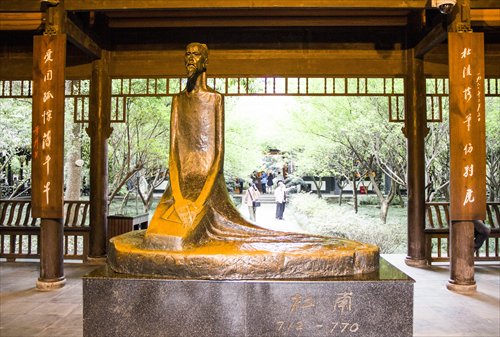Western audiences embrace Tang Dynasty poet documentary
By Sun Wei in London Source:Globaltimes.cn Published: 2020/6/5 7:02:39

A statue of Du Fu sits in the Du Fu Thatched Cottage in Chengdu, Sichuan Province. Photo: IC
British historian Michael Wood's latest documentary has successfully brought a Tang Dynasty (618-907) poet to Western audiences for the first time as mutual understanding remains a top priority amid the global fight against the COVID-19 pandemic.
The one-hour documentary, "Du Fu: China's Greatest Poet," aired on the BBC in April and has since gained popularity among both British and Chinese audiences.
"I was interested in him since I was in school when I read a book of translations from Chinese poetry-Tang poetry- and have been fascinated ever since," Michael Wood, told the Global Times on Thursday, adding that as Professor Stephen Owen of Harvard University says in the film, "There's Dante, there's Shakespeare, and there's Du Fu- they helped create the emotional and moral vocabulary of the culture."
Wood still remembered the first words of Du Fu he ever read when as a schoolboy, "Autumn Wastes," which Owen calls "the greatest words in the Chinese language."
In the documentary, Wood not only traces the turbulent life of Du Fu, but also follows his footprints- starting from Gongyi, Henan Province, to Xi'an, Chengdu, Changsha, and other cities, to paint a rich picture from long ago but felt close by exploring the poet's current influence on Chinese people.
To better present the poetry to western audiences, Wood invited British actor Ian McKellen, who played Gandalf in The Lord of the Rings, to read 15 English-translated poems and articles written by Du Fu.
Great poetry speaks common humanity
Wood believes great poetry is universal because it speaks for common humanity. "Du Fu's poems are about love and family and friendship, about mankind and nature, about war and human suffering: have so many themes common to the world's great poets," Wood said.
Even in translation, common humanity spills over.
Wood recalled the most moving experience during production was meeting everyday people at Thatched Cottage in Chengdu. "I loved their enthusiasm for Du Fu, and for Chinese culture in general: the little girl with her mom and dad, three ladies, a sweet old man who said he came 'many times: at least once every month' and told us he loved Du Fu because 'he spoke for the poor, the ordinary people'."
Wood was impressed with the people he met that spoke strongly of the enduring values of traditional Chinese culture.
The film was made during the autumn just before the COVID-19 outbreak and released in April in the UK, when anti-Chinese sentiments were on the rise, especially in the US.
"Judging from the letters we received from many Chinese people and UK viewers, they appreciated something positive about Chinese culture, which emphasized our common humanity. As in the "Story of China," the Chinese people we meet in the film, including the experts, come across as very warm and approachable," Wood noted.
The director pointed out that one of the biggest issues today is racism and the best way to fight it is to "demonstrate our common humanity and fellow feeling." In that sense, the documentary is not just a factual account of the poet's life. It is about human feelings, moral conscience, and creativity.
Alan MacFarlane, Cambridge University Emeritus Professor, said the film was a beacon of light amid highly negative western coverage of China.
Cultural link connects people
As an accomplished English historian and broadcaster, Wood has produced over 120 historical documentaries, with many of them related to China, such as The Story of China (2016), and The Story of China's Reform and Opening Up (2018).
Wood and his team created the sequence on Du Fu in the BBC series "The Story of China." During production, Wood realized Du Fu's irreplaceable and important position in the history of Chinese culture, which is rarely acknowledged in the West. It was this idea that served as the inspiration for the Du Fu documentary.
"I was curious too, as you must be when you make films, to explore his story further, to see the cottage in Chengdu, visit Baidicheng, and of course to go to Anding near Changsha- a Chinese friend's mom and dad live nearby in Pinjiang and they told me about the Qingming Festival commemoration at Du Fu's tomb," Wood said.
David Bates, Emeritus Professor at the University of East Anglia, said the documentary was, "marvelous as an exhibition of poetry, as biography, and culture."
"It was very pleasing that they thought it was worthwhile, and that they enjoyed it," Wood said, also a professor of Public History at the University of Manchester and president of the Society for Anglo-Chinese Understanding.
Wood plans to make more historical and cultural films about China, including one on the Opium Wars and another on the first British Embassy in China in 1793, and will use sources from both sides.
Wood has visited China multiple times and always enjoys returning to the country.
"After more than 35 years, and especially during the last seven years when I visited over a dozen times, it feels a little bit like my home away from home," Wood said.